Ioannis Metaxas
| Ioannis Metaxas | |
|---|---|
 | |
| Prime Minister of Greece | |
|
In office 13 April 1936 – 29 January 1941 | |
| Monarch | George II |
| Preceded by | Konstantinos Demertzis |
| Succeeded by | Alexandros Koryzis |
| Personal details | |
| Born |
12 April 1871 Ithaca, Greece |
| Died |
29 January 1941 (aged 69) Athens, Greece |
| Political party |
Freethinkers' Party (1922–1936) Independent (1936–1941) |
| Signature |
|
| Military service | |
| Service/branch | Hellenic Army |
| Years of service | 1893–1923 |
| Rank |
|
| Battles/wars | Greco-Turkish War (1897), Balkan Wars, Noemvriana |
Ioannis Metaxas (Greek: Ιωάννης Μεταξάς; 12 April 1871[1] – 29 January 1941) was a Greek military officer and politician, serving as Prime Minister of Greece from 1936 until his death in 1941. He governed constitutionally for the first four months of his tenure, and thereafter as the strongman of the authoritarian 4th of August Regime. On 28 October 1940 he denied an ultimatum imposed by the Italians to surrender Greece to the Axis, thus bringing Greece in WW2.
Military career
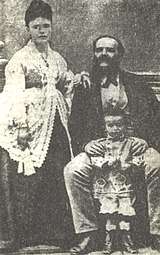
Ioannis Metaxas was born in Ithaca in 1871.[2] His family was inscribed in the Libro d'Oro of the Ionian islands[3], previously a Venetian possession, while its roots originated in the Byzantine nobility.
Following studies at the Hellenic Military Academy, he became a career military officer, being sworn as an Engineers 2nd Lieutenant on 10 August 1890.[2] He first saw action in the Greco-Turkish War of 1897 attached to the staff of the Greek commander-in-chief, Crown Prince Constantine.[2]
After the war he continued his military studies in the Berlin War Academy in 1899–1903. On his return in 1904 he joined the newly formed General Staff Corps.[2] He was part of the modernizing process of the Greek Army before the Balkan Wars (1912-13). However he opposed the Goudi coup.
Balkan Wars
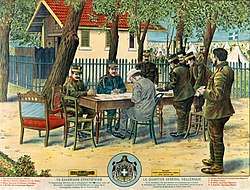
In 1910 he was appointed by Prime Minister Eleftherios Venizelos, who had also assumed the post of Minister of Military Affairs, as his adjutant.[2] In 1912, just before the Balkan Wars, Venizelos appointed Metaxas to negotiate the military treaty between Greece and Bulgaria, sending him to Sofia.[2] He participated in the First Balkan War as a Captain in the operations staff of the Army of Thessaly, before joining Venizelos as a military export in the London Conference of 1912–13 in December 1912.[2] In May 1913, as military plenipotentiary, he negotiated the military terms of the Greek–Serbian Alliance.[2] He took part in the Second Balkan War when he was promoted to Lieutenant Colonel.
After the end of the Balkan Wars, he was appointed director of the 1st (Operations) Directorate of the Army Staff Service, and became deputy head of the Staff Service in January 1915.[2] In October 1913, he was awarded by the King with the Golden Cross of the Redeemer.
Greco-Turkish crisis of 1914
In the spring and summer of 1914, Greece found itself in a confrontation with the Ottoman Empire over the status of the eastern Aegean islands, which had been occupied by Greece in the First Balkan War, and were finally awarded to Greece on 31 January 1914 by the Great Powers.[4] The Ottomans refused to accept this, leading to a naval arms race broke out between the two countries and persecutions of the Greeks in Asia Minor. On 29 May, the Greek government issued an official protest to the Sublime Porte, threatening a breach of relations and even war, if the persecutions were not stopped.[5] On 6 June 1914, Metaxas, as the de facto head of the Staff Service, presented a study on the military options against Turkey: the only truly decisive manoeuvre, a landing of the entire Greek army in Asia Minor, was impossible due to the hostility of Bulgaria; instead, Metaxas proposed the sudden occupation of the Gallipoli Peninsula, without a prior declaration of war, the clearing of the Dardanelles, and the occupation of Constantinople so as to force the Ottomans to negotiate.[6] However, on the previous day, the Ottoman government had suggested mutual talks, and the tension eased enough for Prime Minister Venizelos and the Ottoman Grand Vizier, Said Halim Pasha, to meet in Brussels in July.[7]
World War I and the National Schism
Following the outbreak of World War I, the prospect of Greece's possible entry into the war emerged, especially given the obligation to provide military assistance to Serbia based on the Greek–Serbian Alliance. Already on 12 July 1914, the Serbian government had requested Greece's aid by the terms of the alliance, in the case of an Austrian and Bulgarian attack. Greece rejected the request on the grounds that Serbia had undertaken to provide 150,000 troops in the area of Gevgelija to guard against a Bulgarian attack; in addition, if Greece sent her army to fight the Austrians along the Danube, this would only incite a Bulgarian attack against both countries, with insufficient forces left to oppose it.[8]
Clash with Venizelos over Greece's entry in the war
A German request on 14 July to join the Central Powers was rejected by both Venizelos and King Constantine,[9] but on 1 August, Venizelos sounded out the Allied Powers, Britain, France, and Russia. The Allied governments were lukewarm to Venizelos' proposals, since they hoped to entice Bulgaria on their side, even offering territorial concessions at the expense of Serbia, Greece, and Romania. Russia in particular considered her interests best served if Greece remained neutral.[10] On 19 November, Serbia repeated its request for Greek assistance, supported by the Allies. Venizelos asked Metaxas for an evaluation of the situation; the opinion of the latter was that without a simultaneous entry of Romania into the war on the side of the Allies, Greece's position was too risky. Following the firm refusal of Romania to be drawn into the conflict at this time, the proposal was scuttled.[11]
On 11 January 1915, the British offered Greece "significant territorial concessions in Asia Minor" if it would enter the war to support Serbia, and in exchange for satisfying some of the Bulgarian territorial demands in Macedonia (Kavala, Drama, and Chrysoupolis) in exchange for Bulgarian entry into the war on the side of the Entente.[12] Venizelos argued in favour of the proposal, but again the opinion of Metaxas was negative, for reasons which he laid down in a memorandum on 20 January: the Austrians were likely to defeat the Serbian army before a Greek mobilization could be completed, Bulgaria was likely to flank any Greek forces fighting against the Austrians, while a Romanian intervention would not be decisive. Metaxas judged that even if Bulgaria joined the Allies, it still would not suffice to shift the balance in Central Europe, and recommended the presence of four Allied army corps in Macedonia as the minimum necessary force for any substantial aid to the Greeks and Serbs. Furthermore, Metaxas argued that a Greek entry into the war would once again expose the Greeks of Asia Minor to Turkish reprisals.[13] Venizelos rejected this report, and recommended entry into the war in a memorandum to the King, provided that Bulgaria and Romania also joined the Entente. By that time, however, it was clear that Bulgaria was edging towards the Central Powers, and Romania's determination to remain neutral led the Greek government to again refuse.[14]
However, in February 1915, the Allied attack on Gallipoli began.[15] Venizelos decided to offer an army corps and the entire Greek fleet to assist the Allies, making an official offer on 16 February, despite the King's reservations. This caused Metaxas to resign on the next day in protest, basing his argument on the loss of the element of surprise, the fortification of the straits, the fact that a single army corps was insufficient to alter the balance of forces, and the uncertain and opportunistic stance of Bulgaria. Metaxas insisted that the campaign had been mishandled thus far, and that even if the Allies captured Gallipoli, the Ottomans still fielded 12 divisions in Eastern Thrace.[16] Shaken by Metaxas' resignation, Venizelos convened meetings of the Crown Council (the King, Venizelos, and the living former prime ministers) on 18 and 20 February, but they proved indecisive. King Constantine decided to keep the country neutral, whereupon Venizelos submitted his resignation on 21 February 1915.[17]
Venizelos won the May 1915 elections, and formed a new government on 17 August.[18] When Bulgaria signed a treaty of alliance with Germany and mobilized against Serbia, Venizelos ordered a Greek counter-mobilization (10 September 1916).[19] As part of the mobilization, Metaxas was recalled to active duty as deputy chief of staff.[2] After Venizelos condoned the landing of British and French troops in Thessaloniki to aid the collapsing Serbian army,[20] Venizelos presented his case for participation in the war to Parliament, securing 152 votes in favour to 102 against in a dramatic vote in the early hours 22 September. On the next day, however, King Constantine dismissed Venizelos, and called upon Alexandros Zaimis to form a government.[21]
The "National Schism" and the "Reservists"
This dismissal solidified the rift between monarchists and Venizelists, creating the "National Schism" or National Divide that would plague Greek politics for decades. During the National Schism, Metaxas clearly advocated the preservation of neutrality, believing also that the Central Powers would win the war.
In May and August 1916, Constantine and the General Staff allowed the Fort Roupel and parts of eastern Macedonia to be occupied, without opposition, by the Central Powers. This caused popular anger.[22] In August 1916, Venizelist officers launched a revolt in Greece's northern city of Thessaloniki, which resulted in the establishment of a separate "Government of National Defence" under Venizelos. The new government, with the Allied support, expanded its control over half the country and entered the war on the Allies' side.
Meanwhile, the official Greek state and the royal government remained neutral. King Constantine and Metaxas were accused as pro-German by their Venizelist opponents. Metaxas was later head of the pro-royal forces and creator of the paramilitary "Reservists" forces during the Noemvriana events in Athens.
In June 1917, under Allied pressure, King Constantine finally was deposed, Alexander became King and Venizelos came to power, declaring war officially on behalf of the whole country on 29 June 1917.
Exile and Interwar political career
Metaxas followed the King into exile in Corsica and later found himself with his family to Italy.[23][24]
He returned to Greece in November 1920, after the electoral defeat of Eleftherios Venizelos. He was reinstated in the army with the rank of Major General, but as he opposed the continued Greek campaign in Asia Minor, he resigned and went into retirement on 28 December 1920.[2] He subsequently repeatedly rejected the military leadership of the Greek army. Following the defeat of Greek forces in Asia Minor, King Constantine was again forced into exile by the 11 September 1922 Revolution, this time led by Col. Nikolaos Plastiras. Metaxas moved into politics and founded the Freethinkers' Party on 12 October 1922.
However, his association with the failed royalist Leonardopoulos-Gargalidis coup attempt in October 1923 forced him to flee again the country. Soon after, King George II (son of Constantine I) was also forced into exile. The monarchy was abolished, and the Second Hellenic Republic was proclaimed, in March 1924.
Metaxas returned to Greece soon after, publicly stating his acceptance of the Republic regime. Despite a promising start, and his status as one of the most prominent royalist politicians, Metaxas' foray into politics was not very successful. In the 1926 elections, his Freethinkers' Party claimed 15.78% of the vote and 52 seats in Parliament, putting it almost on a par with the other main royalist party, the People's Party. As a result, Metaxas became Communications Minister in the "ecumenical government" formed under Alexandros Zaimis.
However, infighting within the party and the departure of many members plunged the party to 5.3% and a single seat in the 1928 elections. The 1932 and 1933 elections saw the percentage drop to 1.59%, although the party still returned three MPs, and Metaxas became Interior Minister in the Panagis Tsaldaris cabinet. In the 1935 elections, he cooperated in a union with other small royalist parties, returning seven MPs, repeating the performance in the 1936 elections.
Prime Minister and the 4th of August Regime
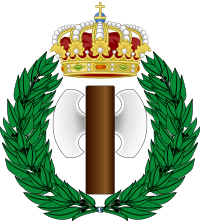
After a heavily rigged plebiscite, George II returned to take the throne in 1935. After the elections on 26 January 1936, Venizelists and anti-Venizelists could not form a government mainly on the question of the return of the democratic officers of the 1935 movement to the army.
In a series of initiatives, King George II was able to play a decisive role in shaping the political scene. On March 5, George II appointed Metaxas the Minister of Defence, a post in which he would remain until his death in 1941. The political significance of this appointment was great since Metaxas was not only a dedicated royalist but one of the few politicians who had supported openly the imposition of an authoritarian, non-parliamentary regime in Greece.
On 14 March, the Demertzis government was sworn in, and Ioannis Metaxas was appointed Vice-President of the government and Minister of Defence. Demetzis died suddenly on 13 April. That same day, the king appointed Metaxas Prime Minister. Following a failure by the Liberals (Venizelists) to come to an agreement with the anti-Venizelist parties, the Metaxas government secured a vote of confidence from the House of Parliament on 27 April with 241 votes in favor, 4 abstentions and 16 against. Three days later, the House of Parliament resolved and suspended its work for five months, authorizing the government to issue legislative decrees on all matters, with the agreement of a parliamentary committee which never operated.
Widespread industrial unrest gave Metaxas justification to declare a state of emergency on 4 August 1936 with the excuse of the "communist danger". With the King's support, he adjourned parliament indefinitely and suspended various articles of the constitution guaranteeing civil liberties. In a national radio address, Metaxas declared that for the duration of the state of emergency, he would hold "all the power I need for saving Greece from the catastrophes which threaten her." The regime created as a result of this self-coup became known as the "4th of August Regime" after the date of its proclamation.
The regime's propaganda presented Metaxas as "the First Peasant", "the First Worker" and "the National Father" of the Greeks. Metaxas adopted the title of Arkhigos, Greek for "leader" or "chieftain", and claimed a "Third Hellenic Civilization", following ancient Greece and the Christian Byzantine Empire of the Middle Ages. State propaganda portrayed Metaxas as a "Saviour of the Nation", bringing unity to a divided country.[25]
Internal policies
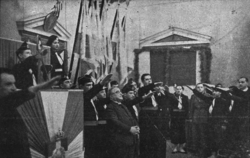
Patterning his regime on other authoritarian European governments of the day (most notably Fascist Italy), Metaxas banned political parties (including his own), prohibited strikes and introduced widespread censorship of the media. National unity was to be achieved by the abolition of the previous political parliamentary system, which was seen as having left the country in chaos (see National Schism).[26] Metaxas disliked the old parties of the political landscape, including traditional conservatives.[26]
Along with anti-parliamentarism, anti-communism formed the second major political agenda of the 4th of August regime.[27] Minister of Security Konstantinos Maniadakis quickly infiltrated and practically dissolved the Communist Party of Greece by seizing its archives and arresting Communist leader Nikos Zachariadis.[28] Metaxas himself became Minister of Education in 1938 and had all school texts re-written to fit the regime's ideology.[29]
Suppressing Communism was followed by a campaign against "anti-Greek" literature viewed as dangerous to the national interest.[29] Book burnings targeted authors such as Goethe, Shaw and Freud, and several Greek writers.[29]
Arthur Koestler, who visited Athens in 1938, noted that even Plato's "Republic" was on Metaxas' list of prohibited books--which in Koestler's view made the Metaxas dictatorship "stupid as well as vicious". At that time Koestler met secretly with members of the underground opposition, hearing from them "horrifying stories of police brutality, especially the case of unspeakable torture inflicted on a young girl who was communist".[30] There had been rumors about the use of castor oil to political prisoners, just like in fascist Italy.
Trying to build a corporatist state and secure popular support, Metaxas adopted or adapted many of Fascist Italy's institutions: a National Labor Service, the eight-hour workday, mandatory improvements to working conditions, and the Social Insurance Institute (Greek: Ίδρυμα Κοινωνικών Ασφαλίσεων, IKA), still the biggest social security institution in Greece.
In terms of symbolism, the Roman salute and the Minoan double-axe, the labrys, were introduced. Unlike Mussolini, however, Metaxas lacked the support provided by a mass political party; indeed, he deliberately positioned himself as being above politics. The regime's only mass organization was the National Organisation of Youth (EON), whose literature and magazines were promoted in schools.[29] Throughout his rule, Metaxas' power rested primarily upon the army and the support of King George II.
.png)
Foreign policy and the war with Italy
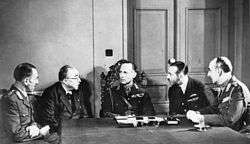
In foreign policy Metaxas followed a neutral stance, trying to balance between the UK and Germany. In the late 1930s, as with the other Balkan countries, Germany became Greece's largest trading partner. Metaxas himself had a reputation as a Germanophile dating back to his studies in Germany and his role in the National Schism. The regime's literature gave praise to fellow European authoritarian states, especially those of Francisco Franco, Benito Mussolini and Adolf Hitler.
However, events gradually drove Metaxas to lean toward France and Britain. King George and most of the country's elites were staunchly anglophile, and the predominance of the British Royal Navy in the Mediterranean could not be ignored by a maritime country such as Greece. Furthermore, the expansionist goals of Mussolini's Italy pushed Greece to lean towards the Franco-British alliance.[31]
Metaxas' efforts to keep Greece out of World War II came undone when Mussolini demanded occupation rights to strategic Greek sites. When the Italian ambassador Grazzi visited Metaxas' residence and presented these demands on the night of 28 October 1940, Metaxas curtly replied in French, "Alors, c'est la guerre" ("Then it is war"). A few hours later, Italy invaded Greece from Albania and started the Greco-Italian War. The Greek Army was able to mount a successful defence and counteroffensive, forcing the Italians back and occupying large parts of southern Albania, usually called by the Greeks "Northern Epirus". In April 1941 Germany invaded Greece.
Death and legacy
Metaxas never saw the joint Fascist-Nazi invasion of Greece during the Battle of Greece because he died in Athens on 29 January 1941 of a phlegmon of the pharynx, which subsequently led to incurable toxaemia. He was succeeded by Alexandros Koryzis. After the death of Metaxas, the invading forces had to take into account the fortifications constructed by Metaxas in Northern Greece. These fortifications were constructed along the Bulgarian border and were known as the Metaxas Line.
To this day Metaxas remains a highly controversial figure in Greek history. He is reviled by some for his dictatorial rule and admired by others for his popular policies, patriotism, defiance to aggression and his military victory against Italy.
Until the military junta of 1967-1974, Metaxas was honoured as the leader of the War against Italy. During the junta, with the exception of a small number of supporters of his regime (namely the banned “4th of August” organization) and few members of the government, no major projects honouring Metaxas were undertaken. Some busts of Metaxas were put up in small towns and the periphery of Athens, mostly after local initiatives. An idea of erecting a Metaxas statue in central Athens was not accepted by the government and Georgios Papadopoulos, who preferred to identify with Eleftherios Venizelos instead, inaugurated in Athens a big statue of latter. In the last years of junta, some minor local officials of the regime, disappointed by the liberalization steps planned by Papadopoulos, erected busts of Metaxas in some towns, in order to upset Papadopoulos. In the meantime, during and shortly after the dictatorship, an imagined ideological connection between the 1967 junta, and the Metaxas regime and fascism was constructed, by means of books and works of art, such as the books of Spyros Linardatos on the 4th of August regime (1965 and 1966) and the film “ Days of '36 by Theo Angelopoulos . This concept was adopted by the antidictatorial struggle and had a profound impact on subsequent historical production. A resistance group blew up a bust of Metaxas in a Piraeus suburb in 1972. The concept became mainstream after 1974. After 1980’s it was not considered proper to claim that the “NO” was said by Metaxas, but rather that it was articulated by the people. The microhistory of Metaxas’ statues is examined by Kouki K. and Antoniou D. in a study on the construction of an ideological commonality between Metaxas, the 1967 junta and fascism in modern Greek history.[32][33]
In modern era (21st century) Metaxas is remembered by the Golden Dawn party, viewing his regime as the ideal for Greece.[34]
See also
References
- ↑ Note: Greece officially adopted the Gregorian calendar on 16 February 1923 (which became 1 March). All dates prior to that, unless specifically denoted, are Old Style.
- 1 2 3 4 5 6 7 8 9 10 11 Συνοπτική Ιστορία του ΓΕΣ, 2001, p. 140.
- ↑ Ευγενίου Ρίζου Ραγκαβή, Livre d' Or de la noblesse ionienne, Vol. 2 - Cephalonie, Αθήναι 1926, Ελευθερουδάκης
- ↑ Επίτομη ιστορία συμμετοχής στον Α′ Π.Π., 1993, pp. 4–6.
- ↑ Επίτομη ιστορία συμμετοχής στον Α′ Π.Π., 1993, pp. 6–8.
- ↑ Επίτομη ιστορία συμμετοχής στον Α′ Π.Π., 1993, pp. 8–9.
- ↑ Επίτομη ιστορία συμμετοχής στον Α′ Π.Π., 1993, p. 8.
- ↑ Επίτομη ιστορία συμμετοχής στον Α′ Π.Π., 1993, pp. 6, 17.
- ↑ Επίτομη ιστορία συμμετοχής στον Α′ Π.Π., 1993, p. 17.
- ↑ Επίτομη ιστορία συμμετοχής στον Α′ Π.Π., 1993, p. 18.
- ↑ Επίτομη ιστορία συμμετοχής στον Α′ Π.Π., 1993, pp. 18–19.
- ↑ Επίτομη ιστορία συμμετοχής στον Α′ Π.Π., 1993, p. 20.
- ↑ Επίτομη ιστορία συμμετοχής στον Α′ Π.Π., 1993, pp. 20–21.
- ↑ Επίτομη ιστορία συμμετοχής στον Α′ Π.Π., 1993, pp. 21–23.
- ↑ Επίτομη ιστορία συμμετοχής στον Α′ Π.Π., 1993, pp. 20–26.
- ↑ Επίτομη ιστορία συμμετοχής στον Α′ Π.Π., 1993, pp. 26–27.
- ↑ Επίτομη ιστορία συμμετοχής στον Α′ Π.Π., 1993, pp. 26–29.
- ↑ Επίτομη ιστορία συμμετοχής στον Α′ Π.Π., 1993, pp. 41–42.
- ↑ Επίτομη ιστορία συμμετοχής στον Α′ Π.Π., 1993, pp. 42–43.
- ↑ Επίτομη ιστορία συμμετοχής στον Α′ Π.Π., 1993, pp. 45–49.
- ↑ Επίτομη ιστορία συμμετοχής στον Α′ Π.Π., 1993, p. 49.
- ↑ Richard Clogg, A Concise History of Greece, 2002
- ↑ Έγγραφο Α. Ράμμου, Γενικά Αρχεία του Κράτους, Αρχείο Ι. Μεταξά, Φακ. 53, όπως αναφέρεται στο Πετρίδης Παύλος, Σύγχρονη Ελληνική Πολιτική Ιστορία, Γκοβόστης, 2000, ISBN 960-270-858-1
- ↑ Λεύκωμα των υπό την αιγίδα της Μεγάλης Στοάς της Ελλάδος Τεκτονικών Στοών, Αθήνα 1998, σελ.47
- ↑ Petrakis, Marina (2006). The Metaxas myth: dictatorship and propaganda in Greece. I.B.Tauris. p. 39. ISBN 1-84511-037-4.
- 1 2 Petrakis (2006), p. 32
- ↑ Petrakis (2006), p. 33
- ↑ Petrakis (2006), p. 34
- 1 2 3 4 Petrakis (2006), p. 37
- ↑ Arthur Koestler, "The Invisible Writing", Ch. 35
- ↑ Petrakis (2006), p. 40
- ↑ [https://www.youtube.com/watch?v=kYYak7FNkI8 Antoniou Dimitris, "Making the Junta Fascist: Anti-Dictatorial Struggle, the Colonels, and the Statues of Ioannis Metaxas", A talk, publishd in youtube.com on May 30, 2017 by Hellenic Studies Program Sacramento State University.]
- ↑ Kouki K. & Antoniou D., (2017). Making the junta fascist: Antidictatorial struggle, the colonels, and the statues of Ioannis Metaxas. Journal of Modern Greek Studies, 35(2), 451-480
- ↑ S. Vasilopoulou, D. Halikiopoulou, The Golden Dawn’s ‘Nationalist Solution’: Explaining the Rise of the Far Right in Greece, Springer, 2015. Chapter "The G. Dawn's populist nation-statism"
Sources
- Επίτομη ιστορία της συμμετοχής του Ελληνικού Στρατού στον Πρώτο Παγκόσμιο Πόλεμο 1914 - 1918 [Concise History of the Hellenic Army's Participation in the First World War 1914–1918] (in Greek). Athens: Hellenic Army History Directorate. 1993.
- Συνοπτική Ιστορία του Γενικού Επιτελείου Στρατού 1901–2001 [A Concise History of the Hellenic Army General Staff 1901–2001] (in Greek). Athens: Hellenic Army History Directorate. 2001. ISBN 960-7897-44-7.
- Pelt, Mogens (Winter 2001). "The Establishment and Development of the Metaxas Dictatorship in the Context of Fascism and Nazism, 1936-41". Totalitarian Movements and Political Religions. 2 (3): 143–172. doi:10.1080/714005461.
- Joachim G. Joachim, Ioannis Metaxas. The Formative Years 1871-1922, Verlag Franz Philipp Rutzen, ISBN 978-3-941336-03-2
External links



- Newspaper clippings about Ioannis Metaxas in the 20th Century Press Archives of the German National Library of Economics (ZBW)
| Political offices | ||
|---|---|---|
| Preceded by Konstantinos Demertzis |
Prime Minister of Greece 13 April 1936 – 29 January 1941 |
Succeeded by Alexandros Koryzis |
